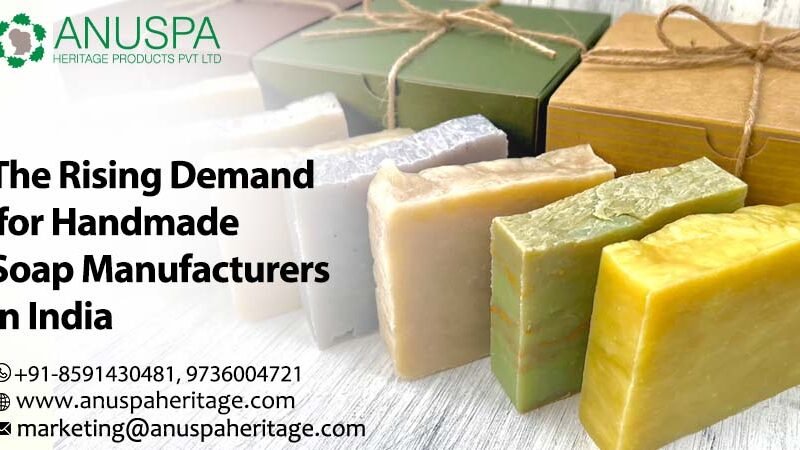
The last few years have noticed a remarkable change in consumer spending habits especially towards the purchase of natural and organic products. The demand for organic skincare products is on the rise and with it, the demand for handmade soaps is increasing much more rapidly. Handmade soap manufacturers in India are now producing different varieties of natural herbal soaps that are free from harmful chemicals to meet the increasing needs of the people.
In this blog, we will analyse the reasons for the increasing number of soap manufacturers in India along with the reasons for the growing consumption of such products.
Why Are Handmade Soaps Gaining Popularity?
Gentle on Skin: The handmade soaps work best for individuals who have sensitive skin. The several natural oils and herbs serve to maintain the moisture of the skin which prevents it from drying and causing irritation.
Supports Local Artisans: The purchasing of handmade soaps encourages craftsmen and small-scale manufacturers resulting in supporting fair trade and sustainable practices in the society.
Better for the Environment: The production and use of biodegradable raw materials for handmade soaps makes them environmentally friendly. When consumers choose handmade soaps instead of mass-produced ones, they contribute in reducing waste and damage to the environment.
Selecting the Best Handmade Soap: A Simple Guide
Before selecting the best handmade soap, one should consider the following points:
Check the ingredients.
Consider your skin type.
Look for eco-friendly and ethical brands.
Check for certification.
Avoid harsh fragrances
test a small sample
Pay attention to soap’s texture
consider soap purpose
How Are Handmade Soap Manufacturers Meeting Growing Demand?
1. Adoption of Natural and Organic Components: The manufacturers of handmade soaps are adopting the use of natural ingredients such as coconut oil, shea butter, olive oil and essential oils due to their value in nourishing the skin. As people are becoming more aware of what goes into their skincare products. They prefer soaps with no harsh chemicals, no parabens or any artificial scents.
2. Product Personalisation: Handmade soap manufacturers allow for a significant increase in flexibility to modify the product as per the different needs of the consumer. Indian manufacturers are producing wholesome soaps for dry skin types, oily skin types, sensitive skin types and even acne-prone skin. Certain ingredients can also be included to help with itching and even ageing skin. Customisation of products helps in boosting satisfaction in customers.
3. Focus on Sustainability and Eco-Friendly Packaging: There is a greater concern for the environment and India based soap manufacturers are adopting sustainable practices by using eco-friendly materials and packaging. Some of the manufacturers are choosing recyclable packaging in place of plastic packaging materials and are adopting cruelty-free practices which means that their products are not tested on animals.
4. Promotion of Traditional and Ayurvedic Benefits: India has a remarkable legacy of using herbal and natural products for skincare. A number of manufacturers of handmade soaps are using traditional Indian ingredients such as turmeric, neem, sandalwood and rosewater in their products. These compounds have been found to be useful for centuries for healing for antibacterial and anti-inflammatory purposes.
5. Improved Quality Control Through Limit Production: The soaps are produced in small quantities which enables the manufacturers to have better understanding of quality control and enables them to focus on the details of the product. This helps to ensure that each batch produced is perfected. In this manner, soap producers are able to maintain their set quality benchmarks without compromising on the customer expectations for luxurious handmade products.
Conclusion
If you wish to find the authentic Handmade Soap Manufacturers in India, Anuspa Heritage is the best option. We manufacture and provide natural, high quality soaps that are ensure to be skin-friendly to all consumers.


Recent Comments